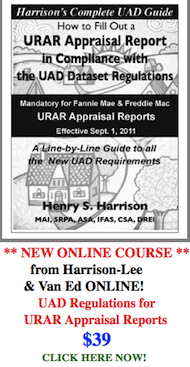WELCOME - Summer 2012

Dear Friends,
Welcome to our Summer 2012 issue!
Big changes are afoot here at REVMAG. In the coming months we will be rolling out whole new sections of the site, to better help appraisers find what they’re looking for!
In the meantime, check out the latest "Ask Henrys", plus Henry's new Editorial, and Book Review, and breaking news for appraisers -- all in this issue.
The Blog and our newsletters are FREE to the appraisal community, and always have been.
Our 14,000 real estate appraisal readers have shown great loyalty and interest over the more than 25 years we've been publishing REV; we really appreciate you all!
Your continued feedback is very important to the success of our endeavors. If you are interested in writing an article for publication, please submit it via email to Ruth Lambert, our editor, at Editor@revmag.com.
Thanks again for your interest in our publications!
HSH
askhenryharrison@revmag.com
P.S. For information regarding advertising opportunities and FREE p.r. in our Blog and email newsletters, please click here: ADVERTISING
*Reprinted with permission, from HOUSES: The Illustrated Guide to Construction, Design and Systems, by Henry S. Harrison
Editorial
When Will the Residential Real Estate Recession End?
Soon, later or never? I predict it will last beyond the term of whomever is elected president this fall.
In 2005, my neighbor, the Yale economist Robert Shiller, predicted in “Irrational Exuberance, 2nd Edition” that the Housing Bubble would soon burst. He was called Dr. Doom in the media, and ignored by most people, especially those in government who might have done something to avert the pending crisis.
The bubble did not burst all at once, as in a stock market crash, but rather, values fell more gradually in some markets and much faster in others, proving once again that there is no "national" real estate market in the country, but rather many different markets, each highly dependent upon location (location, location, location).
Now we are coming up to a national election in the fall of 2012 and we keep hearing murmurs that the end is in sight. This may be true in some localities, like the San Francisco Bay area, but I believe it is wishful thinking in most places in the United States. During 2011, over a million houses were actually foreclosed or sold via short sales. Almost double that number entered into the foreclosure process. The current slow down in foreclosures is not due to the improved economy but rather to a slow down caused by the courts, who are now insisting that the foreclosure documents be legally correct. (Revelations of widespread fraud in document preparation has led to what is probably a temporary reprieve for many homeowners who are currently under water.) There are now about 100 million detached single family homes in the United States of which nearly 15 million are underwater. Furthermore millions of them are vacant.
Here is my own experience, which I believe is typical for Florida and many other parts of the country. The house that we purchased three years ago was built in 1995, at a cost including the site of about $225,000. At its peak in 2005, it was worth about $375,000. We bought it for $130,000 and today it would sell for about $110,000. The cost to build it today would be about the same as in 1995, that it, about $225,000. In our solvent 55+ development with nearly 800 units, about 10% of the houses are on the market. This figure has been constant for the past three years, because as fast as houses are being sold, others come on the market. There are practically no new houses being built in our market area. And there is nothing on the horizon that I can see that is going to significantly change this picture in the near future.
I know two families whose homes have been in foreclosure for over a year. Neither of them make any payments on their mortgage, or pay any taxes. If they were served papers today, it would take six months to a year to actually foreclose their homes and get them out. The lender would then have to fix up the houses, which both have deferred maintenance, and will likely take a 25% to 50% loss on both properties. Their neighbors who have been making their payments all along feel like fools whenever they learn that a delinquent homeowner is not only not being foreclosed on, but often having their mortgage renegotiated with more favorable terms. It makes those folks who are "playing by the rules" feel duped by the system.
I don’t see any quick fix to this problem. What will happen if the government forces the banks to "write down" the mortgages for delinquent homeowners — and doesn't do something similar for those people who've been making their payments all along, even though the value of their home has fallen below the unpaid amount of their mortgage?
I know from what I hear first hand and read that these two examples are duplicated in millions of situations throughout the country. When the bubble burst, those of us who predicted it would take at least 10 years for a recovery were accused of being "gloom and doomers." I predict that in 2015, we will be thought of as too optimistic!
Breaking News
Dear Henry,
I am now considering up grading from a Certified Residential Appraiser to General Certified Appraiser. I get different answers from different people on several of the requirements. For example some people tell me my upgrade work must be supervised by a General Certified Appraisers. Others tell me it is unnecessary. My state appraisal board says it depends what is required by the Appraisal Foundation. I have tried to real all their voluminous requirement but can not find a definitive answer to the question. What do you think.
Sincerely,
OJ
Madison, WS
Dear OJ
You are correct when you say there is no direct definitive answer to this question in the USPAP. There is an answer in the just released Appraisal Qualification Board Q & A Vol.4, No.1 dated June 2012.
This is a summary of what it says:
1. Some states have specific requirements that cover this situation. Therefore the first then than any appraiser who is considering getting a Residential or General Certification is to check with your state to see what their specific requirements are. The simplest way to do this is to send them a letter asking what if any requirement you state has. I always prefer a letter to a verbal request as if some time in the future what you have done is questioned you can fall back on the letter to explain what you did or did not do. The only problem with this communication method is that some states take a very, very long time to answer appraiser inquiry letters. If this apply to you state you should make a verbal inquiry and when you get someone who will talk to you ask them if they have anything in writing that they can send to you.
The entire AQB Q & A Vol.4, No.1, June 2012 is available to download by clicking here.
Article
Citing Flawed Valuations, Bank of America Repurchases
$330 Million in Freddie Mortgages
Bank of America will pay Freddie Mac $330 million dollars to buy back allegedly flawed home loans, Bloomberg reported on May 23.
Dan Frahm, a spokesman for the Charlotte, N.C.-based Bank of America, told Bloomberg that the bank has agreed to the repurchase “because the valuation method used at origination did not meet the investor’s technical requirements.” Frahm noted the flaws have since been repaired.
Bank of America CEO Brian T. Moynihan is looking to mitigate further losses after incurring more than $42 billion dollars in costs related to defective home loans, Bloomberg reported. Buyers and insurers of mortgage securities have insisted on compensation for faulty debt created by Countrywide Financial Corp., which the bank purchased in 2008, at a time when the institution was the nation’s largest residential lender.
Freddie Mac and Bank of America announced a $1.28 billion settlement in January 2011 resulting from bad loans sold through 2008 by Countrywide. Other transactions between the entities were not included in the deal, and a portion of the loans covered by Freddie’s latest announcement had more recent origination dates.
Bank of America’s backlog of pending requests for refunds on shoddy loans reached a record $16.1 billion in the first quarter 2012 as the dispute widened between BOA and Fannie Mae, which ceased accepting new loans from Bank of America in January, according to the Bloomberg report.
“It is also unclear if this is a one-time issue or a process that will be revisited at some regular interval,” the Barclays analysts told Bloomberg. “Another concern would be whether similar buyouts are being considered or being implemented at Fannie Mae.”
Nationally Recognized Appraisal Leader Ann O'Rourke is a featured speaker!






















